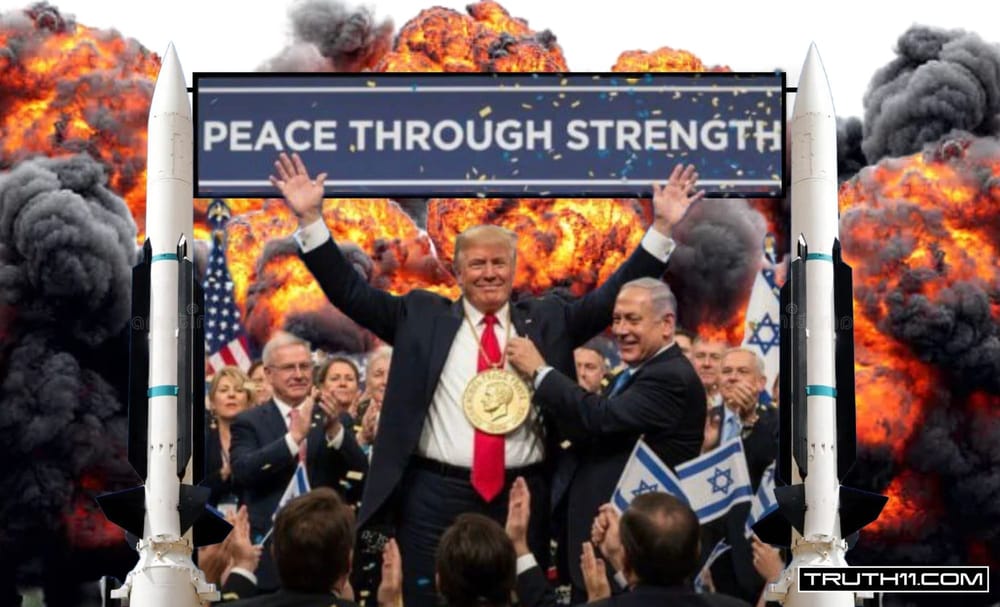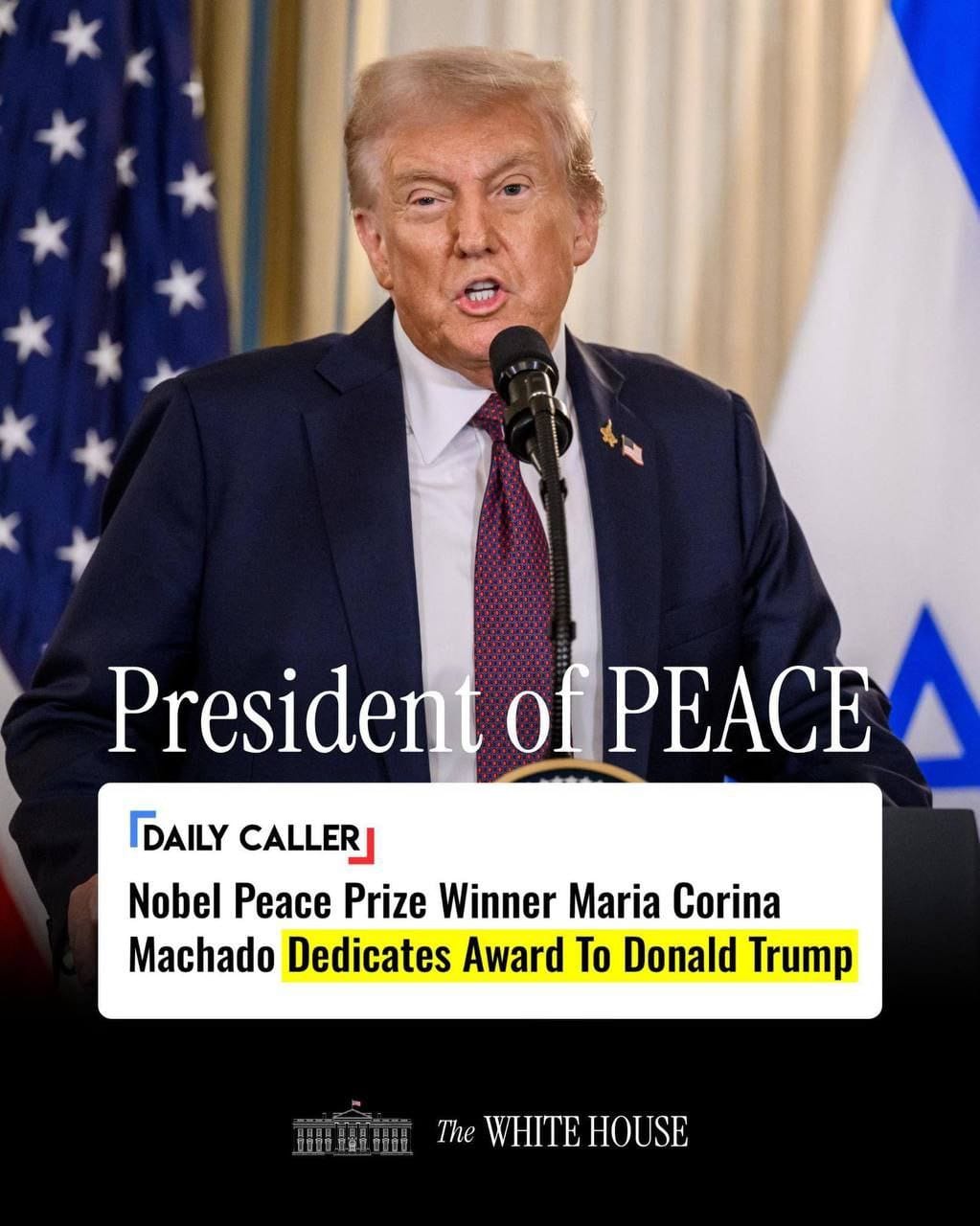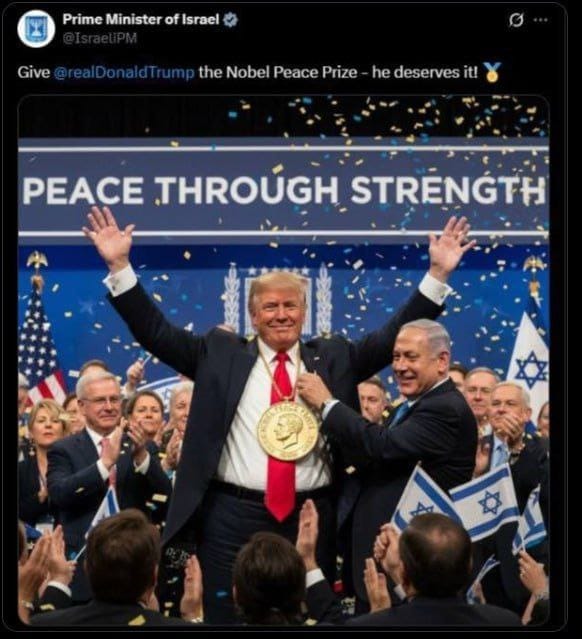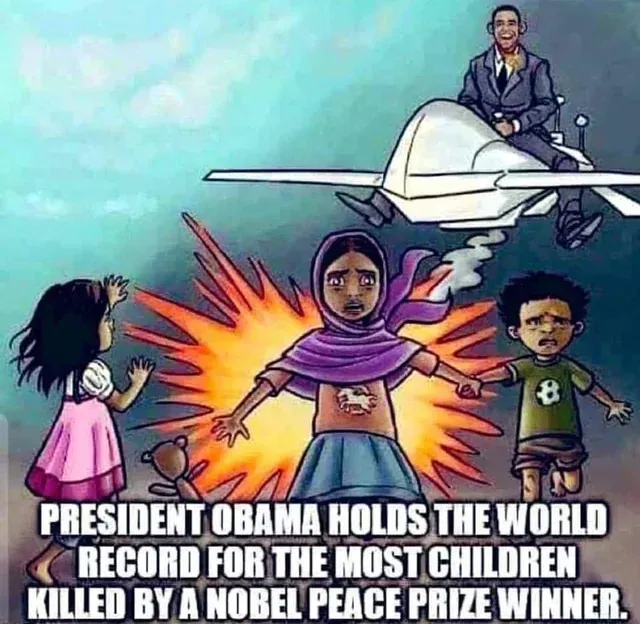Trump Demanded To Be Given The Noble Peace Prize

Fearing Trump’s Wrath Nobel Committee Hands Peace Prize To Regime Change Puppet
LewRockwell.com
Moon Of Alabama | moonofalabama.org
The President of the Unites States Donald Trump had demanded to be given the Noble Peace Prize. But following that demand would have been disastrous for the already blemished prestige of the Noble. The government of Norway, which strongly influences the decisions of the Nobel Peace Prize committee, was in a pickle:
With hours to go until the announcement of this year’s Nobel peace prize, Norwegian politicians were steeling themselves for potential repercussions to US-Norway relations if it is not awarded to Donald Trump.
Mr Trump has long been outspoken about his belief that he should be awarded the peace prize, an honour previously bestowed on one of his presidential predecessors, Barack Obama, in 2009 for his “extraordinary efforts to strengthen international diplomacy and cooperation between peoples”.
In July, Mr Trump reportedly called Jens Stoltenberg, Norway’s finance minister and the former Nato secretary general, to ask about the Nobel prize.
The newspaper columnist and analyst Harald Stanghelle speculated that retribution from Mr Trump – if it were to come – could take the form of tariffs, demands for higher Nato contributions or even declaring Norway an enemy.
After some talks behind the scenes it was decided to give the prize to a different person than Trump but with the very obvious intent to also satisfy Trump by furthering a major foreign policy aim of his:
The Nobel Peace Prize was awarded Friday to Venezuelan opposition leader María Corina Machado who lives in hiding after attempting to run against President Nicolás Maduro.

Machado, 58, was recognized for keeping “the flame of democracy burning amidst a growing darkness” and “ever-expanding authoritarianism in Venezuela.”
She leads the Vente Venezuela opposition party, but was blocked from running as the nation’s president and expelled from office in 2014. She now lives in hiding and faces “serious threats against her life,” the Norwegian Nobel Committee said.
The Trump administration has long aimed at ousting Nicolas Maduro, the socialist leader of Venezuela. It has positioned its military assets around the country and is planing from regime change under false pretense:
Shortly after taking office, Trump declared Tren de Aragua to be a foreign terrorist organization that had “flooded the United States with deadly drugs, violent criminals, and vicious gangs.” In July, the president ordered the Pentagon to target certain Latin American drug cartels. By August, there were eight naval vessels—including destroyers, a cruiser, and a littoral-combat ship—operating in the Caribbean Sea. By September, the first of four boats had been struck, and 21 alleged drug traffickers have now been killed. Last week, the administration sent a confidential notice to Congress signaling its intent to carry out more strikes. The campaign could extend inside Venezuelan territorial waters or include drone strikes inside its land borders, defense officials told us.
But it is far from clear that the ties between Maduro’s government and Tren de Aragua are as extensive as the Trump administration has suggested, or that they exist at all. Ronna Risquez, author of the book El Tren De Aragua, told us there was “no evidence” that Maduro leads gang or drug-smuggling operations; an internal memo from the U.S. National Intelligence Council arrived at a similar conclusion. It’s also not clear that Venezuelan drug operations, centralized or otherwise, are significant enough to merit the country being singled out as a threat to American lives. Venezuela is not a major cocaine or fentanyl producer. And even though most of the world’s cocaine grows in neighboring Colombia, Venezuela is also not a major transit hub.
Trump’s ‘anti-narco terrorist’ campaign is clearly aimed at regime change. This despite extensive offers by the Venezuelan government to allow the U.S. to profit from Venezuelan riches (archived):
Venezuelan officials, hoping to end their country’s clash with the United States, offered the Trump administration a dominant stake in Venezuela’s oil and other mineral wealth in discussions that lasted for months, according to multiple people close to the talks.
The far-reaching offer remained on the table as the Trump administration called the government of President Nicolás Maduro of Venezuela a “narco-terror cartel,” amassed warships in the Caribbean and began blowing up boats that American officials say were carrying drugs from Venezuela.
Under a deal discussed between a senior U.S. official and Mr. Maduro’s top aides, the Venezuelan strongman offered to open up all existing and future oil and gold projects to American companies, give preferential contracts to American businesses, reverse the flow of Venezuelan oil exports from China to the United States, and slash his country’s energy and mining contracts with Chinese, Iranian and Russian firms.
That offer wasn’t enough for a greedy Trump:
The Trump administration ended up rebuffing Mr. Maduro’s economic concessions and cut off diplomacy with Venezuela last week. The move effectively killed the deal, at least for now, the people close to the discussion said.
The Trump administration did away with generous offer because it is confident that its plans for regime change will achieve a total domination over Venezuela.
The new Noble Peace Prize laureate, María Corina Machado, plays a big role those plans.
Who is that lady you might ask. In July 2024 the NY Times published a friendly portrait of her (archived):
Ms. Machado, a conservative former member of the national assembly once rejected by her own colleagues, has not only corralled Venezuela’s fractious opposition behind her, but has also captivated a broad swath of the electorate with a promise for sweeping government change.
If the opposition wins, Mr. González, 74, will be president. But from Washington to Caracas, everyone understands that Ms. Machado is the driving force behind the movement.
She became a political activist in 2002, helping to found a voter rights group, Súmate, that eventually led a failed effort to recall Mr. Chávez. She was a darling of Washington — the U.S. government provided financial aid to Súmate — and became one of Mr. Chávez’s most detested adversaries.
But it wasn’t just the government that loathed her. Among colleagues in the opposition, she was often viewed as too conservative, too confrontational and too “sifrina” — Venezuelan for “snobbishly high class” — to become the movement’s leader.
She has said that the politician she most admires is Margaret Thatcher, the conservative icon known for her stubbornness and fealty to the free market. And Ms. Machado has long supported privatizing PDVSA, the state oil company, a move other opposition leaders say would put Venezuela’s most valuable resource in the hands of a few.
Machado, while on the U.S. payroll, was involved in a 2002 military coup attempt in Caracas:
Questions still surround Ms. Machado’s actions in 2002, when dissident military officers and opposition figures led a short-lived coup meant to oust Mr. Chávez. Ms. Machado was at the presidential palace during the installation of a new president, Pedro Carmona.
In the 2005 interview with The Times, Ms. Machado insisted that she and her mother were in the palace that day only to visit Mr. Carmona’s wife, a family friend — not to support the coup.
More recently, in a 2019 interview with the BBC, Ms. Machado called on “Western democracies” to understand that Mr. Maduro would only leave power “in the face of a credible, imminent and severe threat of the use of force.”
Machado even asked the Zionist war criminal Benjamin Netanyahoo for military support in a coup (edited machine translation) :
María Corina Machado asked the prime minister of Israel, Benjamin Netanyahu, a military intervention in Venezuela, through a document posted on its social network X in 2018.
Machado described the military intervention of “power and influence” against the Venezuelan government.
“Today sending a letter to Mauricio Macri, President of Argentina, and to Netanyahu, Prime Minister of Israel, to ask them to apply their strength and influence to advance the dismantling of the criminal regime in Venezuela, intimately linked to drug trafficking and terrorism,” she wrote.
In addition, the document points out that Machado was “convinced that the international community, according to the doctrine of the responsibility to protect, is called to give Venezuelans the support needed to generate the change,” a change of government.
Machado is still in cahoots with (and likely still payed by) the U.S. to further regime change in Venezuela (archived):
U.S. Secretary of State Rubio met with five opposition figures in May who secretly fled to the United States in what he called a “precise operation.” He has praised the opposition leader, María Corina Machado, whom he called by her nickname, the “Venezuelan Iron Lady,” in a tribute this year.
Pedro Urruchurtu, an adviser to Ms. Machado, said in an interview that the opposition had developed a plan for the first 100 hours after Mr. Maduro’s ouster that would involve a transfer of power to Edmundo González, who ran for president against Mr. Maduro last year.
“What we’re talking about is an operation to dismantle a criminal structure, and that includes a series of actions and tools,” Mr. Urruchurtu said, adding: “It has to be done with the use of force, because otherwise it wouldn’t be possible to defeat a regime like the one we’re facing.”
The opposition’s plans include persuading other governments to take diplomatic, financial, intelligence and law enforcement actions, he said.
To recap – the Noble Peace Prize committee is giving the prize to an opposition politician in South America who is on the payroll of the U.S. government and has been involved in previous military coups attempts in her country. Her advisor is arguing for the use force to overthrow the government. Ms. Machado’s plan is to the sell out whatever Venezuelans have to the foreign empire that pays her.
The Noble Committee and Norway may, for now, have saved themselves from Trump’s wrath but the decision to award the prize to Ms. Machado is another huge blemish to its record.
Original Article: https://www.lewrockwell.com/2025/10/no_author/fearing-trumps-wrath-nobel-committee-hands-peace-price-to-regime-change-puppet/

The Nordic War Prize
PaulCraigRoberts.org
From a reader:
The expectation was that the Nobel Peace Prize would achieve its final disgrace by being awarded to Donald Trump. But it is actually worse than that.
María Corina Machado can’t even boast of wanting to make peace as Trump likes to do. Giving her the Nobel Peace Prize is nothing but an open invitation to the United States to unleash its regime change war against Venezuela.
The Peace Prize has evolved into an Incitement to War Prize.
Nothing could better express the moral degradation of the official West.
Western elites are dragging us all down to disaster.
Did the Nobel Peace Prize go to the Venezuelan opposition leader, a person believed to be Washington’s puppet, as a payment for serving as cover and legitimacy for Washington’s overthrow of the Venezuelan government?
It seems Washington is going to again save Democracy by overthrowing a democratically elected government.
Original Article: https://www.paulcraigroberts.org/2025/10/11/the-nordic-war-prize/

TheNewAmerican.com
Ron Paul | When it comes to destroying your brand, Norwegian Nobel Committee is the Bud Lite of peace prizes. After all, back in 2009 they gave the Peace Prize to a President Barack Obama who then went on to bomb at least seven countries, set the Middle East on fire, and even conduct drone strikes on American citizens!
Other awardees have had similarly suspicious records as peacemakers. They even gave a Peace Prize to the likes of Henry Kissinger. ~ Source: https://thenewamerican.com/opinion/the-nobel-war-is-peace-prize/

Comments ()